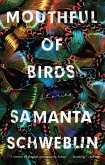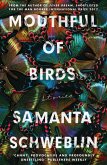Set in a stark landscape of cliffs and precipices high above the Argentine pampas, Mariana Travacio's All That Dies in April follows the members of one small family as each makes a solitary journey out of their treacherous mountain home in search of a better life.
"Hypnotic, almost ancestral voices echo through this novel like whispers in the wilderness, like orphan cries and wounds of light accompanying us on a powerful journey from which none of us will emerge unscathed." -Agustina Bazterrica, bestselling author of Tender is the Flesh
Lina has dreamt for years of leaving her tiny village in the drought-stricken region. Her son left long ago to find work and a better fortune. Relicario, her husband, is content to stay put in the land of his ancestors, tending to their graves. Ignoring Relicario's pleas, a desperate Lina decides to abandon their home in search of her son, work, and water. She starts her journey on foot, and Relicario eventually follows behind, bringing a donkey and a sack with his ancestors' bones. Both witness unspeakable violence, cruelty, and folly, but the hope of reuniting their family keeps them alive. Poetically charged, restrained, and delicately condensed, this is a suspenseful ancestral tale rooted in a long Latin American history of rural displacement and perpetual inequality.
"Hypnotic, almost ancestral voices echo through this novel like whispers in the wilderness, like orphan cries and wounds of light accompanying us on a powerful journey from which none of us will emerge unscathed." -Agustina Bazterrica, bestselling author of Tender is the Flesh
Lina has dreamt for years of leaving her tiny village in the drought-stricken region. Her son left long ago to find work and a better fortune. Relicario, her husband, is content to stay put in the land of his ancestors, tending to their graves. Ignoring Relicario's pleas, a desperate Lina decides to abandon their home in search of her son, work, and water. She starts her journey on foot, and Relicario eventually follows behind, bringing a donkey and a sack with his ancestors' bones. Both witness unspeakable violence, cruelty, and folly, but the hope of reuniting their family keeps them alive. Poetically charged, restrained, and delicately condensed, this is a suspenseful ancestral tale rooted in a long Latin American history of rural displacement and perpetual inequality.
Praise for All That Dies in April
"Hypnotic, almost ancestral voices echothrough this novel like whispers in the wilderness, like orphan criesand wounds of light accompanying us on a powerful journey from which none ofus will emerge unscathed." -Agustina Bazterrica, bestselling author of Tender is the Flesh
"A woman sets off from her mountain home in search of the ocean and the possibility of a better life. Spare and yet echoing with voices, Travacio's English-language debut captures the haunting cycles of death and displacement but also of life, joy, and the succor of community in a place where "families come together and break apart...as easily as storm clouds in the sky." An illuminating fable of family-both blood and found." -Kirkus Reviews
"In Mariana Travacio's compact and lyrical novel All That Dies in April, a woman leaves the parched landscape of hervillage above the Argentinian pampas to search for the sea. A visceral and emotional migratory quest propels the haunting novel."-Foreword Review
"An author I want to talk about all the time." -ANDREA ABREU, author of Dogs of Summer
"Travacio writes with sharp lyricism and a killer pace." -MARTA SANZ
"Travacio skillfully draws a desolate universe." -DOLORES REYES, author of Eartheater
"Mariana Travacio's prose so successfully endows the characters with bodies and Lina's voice with life that we can hear her whispering what she sees and what is happening in our ear, as if everything were a marvel and a secret ... Travacio has written a roadless road novel, in which characters invent a route that drags them step by step to meet a dark fate." -DEBRET VIANA, Página 12
"This is a novel of ghostly voices resounding in huge spaces, with a language that goes straight to the bone: no stridency, no superfluous adjectives, as if to these characters only the concrete existed." -WALTER LEZCANO, Clarin
"The female protagonist of All That Dies in April abandons a place reminiscent of Pedro Páramo's Comala, to discover the light of the plains of The Adventures of China Iron by Gabriela Cabezón Cámara. ... Travacio's novel finds a way to show the life inhabiting those territories where nothing seems to appear." -VERÓNICA BOIX, La Nación
"A timeless fable about disobedience. In a poetic and concise style, Mariana Travacio's second novel narrates an odyssey taking place not on oceans or battlefields but on mountains and in a rural setting." -DANIEL GIGENA, La Nación
"Travacio's heroes are figures in transit, beings in search of a destiny they don't fully understand but chase nonetheless as if their lives depended on it. Or better: as if their lives depended on not reaching it." - PATRICIO ZUNINI, Infobae
Praise for Como si existiese el perdón
"One of the best books I read this year." -PILAR QUINTANA, author of 2023 National Book Award Finalist Abyss
"The best book I have read in ages. An old and new story on vengeance, men, and the open land. It feels like curvy and soft lines that gradually flinch until they almost perforate the reader experience." -ANDREA ABREU, author of Dogs of Summer
"Hard to put down and even harder to stop thinking about. It sits at the intersection of several literary genres that cut deeply through psychological echoes, repetitions, and transgressions in an unsettling and unforgettable way." -Latin American Literature Today
"Hypnotic, almost ancestral voices echothrough this novel like whispers in the wilderness, like orphan criesand wounds of light accompanying us on a powerful journey from which none ofus will emerge unscathed." -Agustina Bazterrica, bestselling author of Tender is the Flesh
"A woman sets off from her mountain home in search of the ocean and the possibility of a better life. Spare and yet echoing with voices, Travacio's English-language debut captures the haunting cycles of death and displacement but also of life, joy, and the succor of community in a place where "families come together and break apart...as easily as storm clouds in the sky." An illuminating fable of family-both blood and found." -Kirkus Reviews
"In Mariana Travacio's compact and lyrical novel All That Dies in April, a woman leaves the parched landscape of hervillage above the Argentinian pampas to search for the sea. A visceral and emotional migratory quest propels the haunting novel."-Foreword Review
"An author I want to talk about all the time." -ANDREA ABREU, author of Dogs of Summer
"Travacio writes with sharp lyricism and a killer pace." -MARTA SANZ
"Travacio skillfully draws a desolate universe." -DOLORES REYES, author of Eartheater
"Mariana Travacio's prose so successfully endows the characters with bodies and Lina's voice with life that we can hear her whispering what she sees and what is happening in our ear, as if everything were a marvel and a secret ... Travacio has written a roadless road novel, in which characters invent a route that drags them step by step to meet a dark fate." -DEBRET VIANA, Página 12
"This is a novel of ghostly voices resounding in huge spaces, with a language that goes straight to the bone: no stridency, no superfluous adjectives, as if to these characters only the concrete existed." -WALTER LEZCANO, Clarin
"The female protagonist of All That Dies in April abandons a place reminiscent of Pedro Páramo's Comala, to discover the light of the plains of The Adventures of China Iron by Gabriela Cabezón Cámara. ... Travacio's novel finds a way to show the life inhabiting those territories where nothing seems to appear." -VERÓNICA BOIX, La Nación
"A timeless fable about disobedience. In a poetic and concise style, Mariana Travacio's second novel narrates an odyssey taking place not on oceans or battlefields but on mountains and in a rural setting." -DANIEL GIGENA, La Nación
"Travacio's heroes are figures in transit, beings in search of a destiny they don't fully understand but chase nonetheless as if their lives depended on it. Or better: as if their lives depended on not reaching it." - PATRICIO ZUNINI, Infobae
Praise for Como si existiese el perdón
"One of the best books I read this year." -PILAR QUINTANA, author of 2023 National Book Award Finalist Abyss
"The best book I have read in ages. An old and new story on vengeance, men, and the open land. It feels like curvy and soft lines that gradually flinch until they almost perforate the reader experience." -ANDREA ABREU, author of Dogs of Summer
"Hard to put down and even harder to stop thinking about. It sits at the intersection of several literary genres that cut deeply through psychological echoes, repetitions, and transgressions in an unsettling and unforgettable way." -Latin American Literature Today








